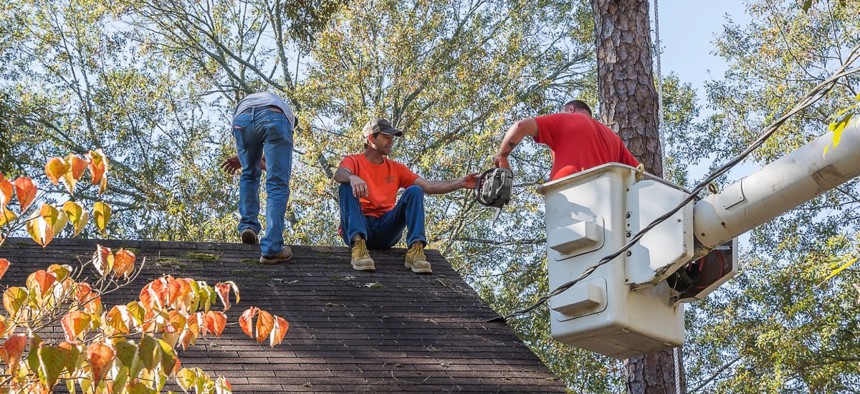The Disappearing Right to Earn a Living

Seven different jurisdictions require a license to be a tree trimmer.

Connecting state and local government leaders
Want to become a florist in Louisiana? A home-entertainment installer in Connecticut? Or a barber anywhere? You’re going to need a license for that—and it’s going to cost you.
In most states, a person who desires to install home-entertainment systems for a living, or as a part-time gig for extra cash, faces relatively few barriers to entry. This is work teenagers routinely do for grandparents after they make a technology purchase. But in Connecticut, a home-entertainment installer is required to obtain a license from the state before serving customers. It costs applicants $185. To qualify, they must have a 12th-grade education, complete a test, and accumulate one year of apprenticeship experience in the field. A typical aspirant can expect the licensing process to delay them 575 days.
These figures are drawn from License to Work, a report released this week by the Institute for Justice, a public-interest law firm that has sued state governments on behalf of numerous small-business owners and members of the working class who’ve faced unduly onerous obstacles while trying to earn a living.
Occupational-licensing obstacles are much more common than they once were. “In the 1950s, about one in 20 American workers needed an occupational license before they could work in the occupation of their choice,” the report states. “Today, that figure stands at about one in four.” These requirements are at their most reasonable when regulating occupations such as anesthesiologist or airline pilot, as in those instances, they can mostly affect a privileged class.
They are at their most pernicious when they are both needless and most burdensome to the middle class, the working class, and recent immigrants to a society. The IJ report focuses its attention on these cases, surveying 102 lower-income occupations across all 50 states and the District of Columbia. It concludes that “most of the 102 occupations are practiced in at least one state without state licensing and apparently without widespread harm.” In other words, dropping many of those requirements likely wouldn’t do any harm. Just 23 of the occupations surveyed are licensed in at least 40 states. Their online dataset helpfully allows anyone to search occupations per their interests. I learned that all 50 states license barbers while just 13 license bartenders.
To be a florist in Louisiana, the only state to regulate them, one must take an exam and pay $189. Seven different jurisdictions require a license to be a tree trimmer. California demands that tree trimmers have four years experience, pay $529, and take two exams; Maryland requires two years of training and one year of experience.
To underscore the irrationality of various requirements, IJ compares them to people charged with saving the lives of their fellow humans during emergencies:
EMTs hold lives in their hands, yet 73 other occupations have greater average licensure burdens: barbers and cosmetologists, home entertainment installers, interior designers, log scalers, manicurists and numerous contractor designations … while the average cosmetologist must complete 386 days of training, the average EMT must complete a mere 34. Even the average tree trimmer must complete more than 16 times the amount of education and experience.
Texas requires licenses for 37 occupations studied in the report. Said Texas Supreme Court Justice Don Willett, concurring in a 2015 case that struck down occupational licensing requirements for people engaged in eyebrow threading:
As today’s case shows, the Texas occupational licensure regime, predominantly impeding Texans of modest means, can seem a hodge-podge of disjointed, logic-defying irrationalities, where the burdens imposed seem almost farcical, forcing many lower-income Texans to face a choice: submit to illogical bureaucracy or operate an illegal business? Licensure absurdities become apparent when you compare the wildly disparate education/experience burdens visited on various professions. The disconnect between the strictness of some licensing rules and their alleged public-welfare rationale is patently bizarre.
Too often, occupational-licensing laws are less about protecting workers or consumers as a class than they are about protecting the interests of incumbents. Want to compete with me? Good luck, now that I’ve lobbied for a law that requires you to shell out cash and work toward a certificate before you can begin.
How to withdraw the undue status that incumbent interests are exploiting?Among several worthwhile reforms advanced in the report’s conclusion, I was taken by the call to make it easier for aspiring workers and entrepreneurs to bring legal challenges against licensing laws. “The U.S. Constitution protects the right to earn an honest living free from unreasonable government interference, yet courts have often been reluctant to enforce this right by striking down arbitrary or irrational licensing laws,” it notes. “Under the prevailing legal standard, licensing laws are presumed valid when challenged in court, and individuals must prove that they are unconstitutional. This gets it exactly backward. Governments should have to prove that licensing laws advance legitimate health and safety concerns to justify restrictions on the right to earn a living.”
A central plank of the American dream is at stake.
Conor Friedersdorf is a staff writer at The Atlantic, where this article was originally published.

NEXT STORY: Sexual Harassment Training Lacking in Many Statehouses





